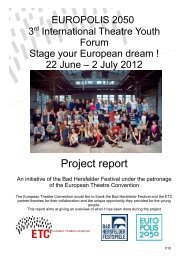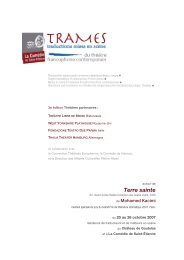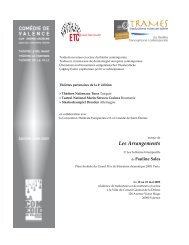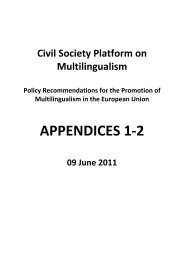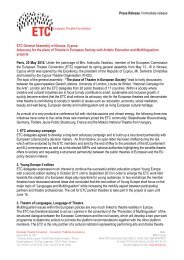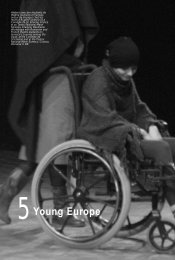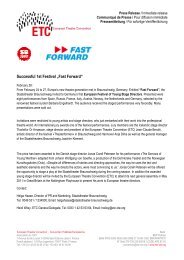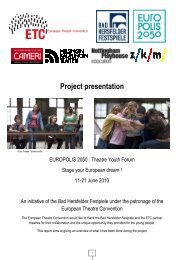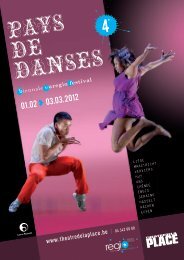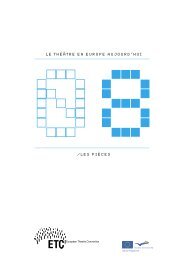Le théâtre en Europe aujourd'hui - European Theatre Convention
Le théâtre en Europe aujourd'hui - European Theatre Convention
Le théâtre en Europe aujourd'hui - European Theatre Convention
Create successful ePaper yourself
Turn your PDF publications into a flip-book with our unique Google optimized e-Paper software.
switzerland (german-speaking)<br />
> deutsche schweiz<br />
suisse allemande<br />
+ info<br />
> www.etc-cte.org<br />
158<br />
ADDRESS/ADRESSE<br />
c/o Hartmann & Stauffacher<br />
Verlag<br />
Bismarckstraße 36<br />
50672 Köln<br />
T: + 49 221 485 386<br />
E: info@hsverlag.com<br />
><br />
WORKS/ŒUVRES<br />
Die Reise von Klaus und Edith durch<br />
d<strong>en</strong> Schacht zum Mittelpunkt der<br />
Erde; Mei<strong>en</strong>bergs Tod; Vier Bilder<br />
der Liebe; Die sexuell<strong>en</strong> Neuros<strong>en</strong><br />
unserer Eltern; Alices Reise in die<br />
Schweiz<br />
PREMIERE/CRÉATION<br />
Thalia Theater Hamburg<br />
29.01.05<br />
DIRECTOR/METTEUR EN SCÈNE<br />
Stephan Kimmig<br />
ADDRESS/ADRESSE<br />
c/o Thalia Theater Hamburg<br />
Alstertor<br />
20095 Hamburg<br />
T: + 49 40 32 814 0<br />
E: dramaturgie@thalia-theater.de<br />
PUBLISHER/EDITEUR<br />
Hartmann & Stauffacher Verlag<br />
Bismarckstraße 36<br />
50672 Köln<br />
T: + 49 221 485 386<br />
E: info@hsverlag.com<br />
TRANSLATIONS/TRADUCTIONS<br />
Spanish/Espagnol, English/Anglais,<br />
Polish/Polonais, Fr<strong>en</strong>ch/Français,<br />
Flemish/Flamand, Swedish/Suédois<br />
CHARACTERS/PERSONNAGES<br />
5 male/hommes<br />
4 female/femmes<br />
Lukas Bär fuss 1971<br />
der bus<br />
(das zeug einer heilig<strong>en</strong>)<br />
the bus (the stuf f of a saint)<br />
le bus (l’étof fe d’une sainte)<br />
Erica has to go to Tsch<strong>en</strong>stochau, in Poland, to the Black Madonna.<br />
God himself has ordained this pilgrimage. However, if she doesn’t<br />
arrive exactly on St Sophie’s Day, something dreadful will<br />
happ<strong>en</strong>. So speaks the prophecy. But Erica gets on the wrong bus,<br />
Hermann’s Bus, which is on its way into the hills with a strange<br />
cargo of health spa <strong>en</strong>thusiasts. By the time she realizes her<br />
mistake it is too late. Already they have reached the mountains,<br />
night has fall<strong>en</strong> and Hermann is in a hurry. A lonely filling station<br />
is the only stop along the way and the last possible place for<br />
Hermann to rid himself of his young stowaway. But ev<strong>en</strong> here she<br />
is rejected. It seems that Erica has no choice but to put up with<br />
the group of sick, brok<strong>en</strong> and otherwise hopeless cases – a group of<br />
tourists who are as likely to go to their deaths in a mass suicide as<br />
to a health spa hotel. This young Swiss author’s play is about faith,<br />
love, redemption, salvation, about the differ<strong>en</strong>ces betwe<strong>en</strong> political<br />
and religious diss<strong>en</strong>t, about human dignity and the advantages of<br />
rapeseed diesel. But most of all it is about language and about<br />
what happ<strong>en</strong>s wh<strong>en</strong> one knows what to say, but has no idea where<br />
to find the appropriate words. In an unusual and surprising way, this<br />
play touches a nerve of our time.<br />
Erika doit aller à Tsch<strong>en</strong>stochau <strong>en</strong> Pologne pour voir la Madone<br />
noire. Dieu <strong>en</strong> personne le lui a ordonné. Si elle n’arrive pas à<br />
l’heure le jour de la Sainte Sophie, un grand malheur arrivera, dit<br />
la prophétie. Mais Erika monte dans le mauvais bus, dans celui<br />
de Hermann qui emmène un groupe de curistes à la montagne.<br />
Lorsqu’elle se r<strong>en</strong>d compte de son erreur, il est trop tard. <strong>Le</strong> bus<br />
se trouve déjà dans la montagne, <strong>en</strong> pleine nuit, et Hermann est<br />
pressé. Il n’y a plus qu’une pompe à ess<strong>en</strong>ce isolée sur le chemin.<br />
C’est là, au plus tard, qu’il veut se débarrasser de la jeune femme<br />
sans ticket. Mais là non plus, on ne veut pas d’elle. Il semble que<br />
Erika n’ait pas d’autre choix que de suivre ce groupe de voyageurs<br />
bizarres composé de malades, de g<strong>en</strong>s abîmés par la vie et d’autres<br />
qui ont besoin de rédemption, un groupe de voyageurs qui pourrait<br />
tout aussi bi<strong>en</strong> partir <strong>en</strong> cure que pour un suicide collectif. Dans la<br />
pièce du jeune auteur suisse, il s’agit de foi, d’amour, de rédemption,<br />
du salut de l’âme, de la différ<strong>en</strong>ce <strong>en</strong>tre la résistance politique et<br />
religieuse, de la dignité humaine, des avantages du diesel au colza<br />
et, avant tout, de la langue et de ce qui se passe lorsqu’on sait de<br />
quoi il faudrait parler, mais qu’on n’a aucune idée d’où trouver les<br />
mots pour l’exprimer. Ceci frappe juste, de manière merveilleuse,<br />
l’esprit de l’époque.



